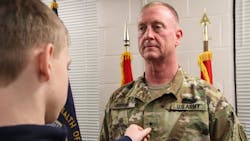FF Leading KY Military's Charge in COVID-19 Pandemic
By Jack Brammer
Source Lexington Herald-Leader
Editor's note: Find Firehouse.com's complete coverage of the COVID-19 pandemic here.
Rob Larkin, 56, is no stranger to dangerous situations.
As a Lexington firefighter since 1992 who now holds the title of battalion fire chief for special operations, Larkin has had his share of precarious work experiences.
“I’ve had some times in my life. A number of us firefighters nearly bought it at the UK administration building fire,” he said. That was in May 2001.
In Afghanistan in 2003-04 and in Iraq in 2007-08, Larkin kept an eye out for potential enemies as he was a combat adviser in Afghanistan and helped oversee security forces in Iraq. He started his Kentucky Guard career in 1988.
Now, Larkin is battling the most dangerous situation of our lifetimes, helping lead Kentucky’s military charge in the coronavirus pandemic.
“We’re going to win this,” Larkin said. “It’s going to take the cooperation of all our governments and all of our citizens, but we can do this.”
Larkin, a native of Maysville, is Adjutant General Hal B. Lamberton’s choice to oversee such missions as the alternative care facility at the state fairgrounds in Louisville, support for drive-through testing centers, and food bank logistical support.
He received the title of assistant adjutant general and promotion to brigadier general of the Army on March 23.
“We have about 800 Kentucky National Guard members, soldiers and airmen on these assignments,” he said. “I have nothing but love for our soldiers and their families. They are stepping up.”
About 200 soldiers from the Kentucky National Guard spent four days turning a cavernous exhibit hall at the state fairgrounds into a field hospital for patients recovering from COVID-19.
The 288-bed site, located in the South Wing of the Kentucky Fair and Exposition Center, was ready to go by late April but had not yet been used.
“We really hope it doesn’t have to, but it is ready in case,” Larkin said.
Nearly 200 troops, including 82 doctors, nurses and medics stood ready to provide around-the-clock medical care at the facility should area hospitals reach capacity.
The hospital, which can be expanded to 2,000 beds, was designed to treat patients who are in their last days of recovery and don’t need intensive medical care.
“The Guard was there to help but so were a lot of other agencies, ranging from state Department of Public Health, Norton Hospital and Jefferson County EMS,” Larkin said.
The state’s soldiers also have been supporting local law enforcement and hospitals with such tasks as traffic control and building and environmental safety.
The soldiers also have been working at the various drive-through testing centers that have popped up across the state.
Another mission for the Guard, said Larkin, is helping with food banks.
“That mission has slowed up a bit but we remain involved in helping food banks in Lexington, Louisville, Elizabethtown and Wilder,” he said.
The Guard, from the beginning, also has been working with the state public health department to assist with distribution of protective gear for front-line workers and is prepared to assist nursing homes with transportation of residents.
All the soldiers involved in the missions, said Larkin, have been trained about their own safety. “They all have standing orders with them on what to do,” he said.
Larkin said the state Guard “started tracking the virus in China in February. We dusted off our pandemic plan. But nothing like this has happened since the 1918 Spanish flu.”
Larkin recalls that in October 2014, when he was a captain in the Lexington Fire Department, he was assigned to take protective measures for firefighters against the Ebola virus.
“But this virus now is something else,” he said.
When his COVID-19 mission is completed, Larkin said, he will return to his Lexington job. He and his wife, Tracy, live in Winchester. They have a daughter, Cecily, 27, who lives in Lexington, and a son, Aidan, 14, at home.
As a “traditional Guardsman,” Larkin regularly drills one weekend a month and generally two weeks in the summer.
He says when the need arises, he gets called up to full time support, much like the other 800 or so Guard members that have been called to support the COVID-19 response.
“Regarding the crisis we’ve found ourselves in, this pandemic is something we’ve never seen before, but I know we will get through it and I know the Kentucky Guard will be instrumental in the support,” he said as he was promoted to brigadier general in a small ceremony in Frankfort in March as the virus spread. “We will continue to be ‘mission first, people always.’”
———
©2020 the Lexington Herald-Leader (Lexington, Ky.)
Visit the Lexington Herald-Leader (Lexington, Ky.) at www.kentucky.com
Distributed by Tribune Content Agency, LLC.






